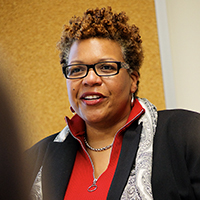In Wake of Orlando Deaths: Expert on Mass Violence
Tanya L. Sharpe, PhD, MSW, an associate professor at the University of Maryland School of Social Work (SSW) focuses on coping in the aftermath of a mass shooting or other atrocity such as the one that occurred June 12 in Orlando, Fla.
Her research has equipped Sharpe to speak to what parents, grasping for words at the violence, may wish to say to their children. That was the subject when Sharpe appeared as a guest on WBAL-TV’s program, "11 TV Hill" with Jason Newton on June 19.

Tanya L. Sharpe, PhD, MSW, associate professor at the University of Maryland School of Social Work.
Similarly, Sharpe joined a panel discussion on Sean Yoes' program on WEAA-FM, "First Edition June 14: The Unprecidented Epidemic of Gun Violence in America." There she spoke not only about mass violence such as that at the Pulse nightclub in Orlando but about homicide and its victims. She also appeared on June 13 on WBFF-TV, advising listeners that it’s futile to try to shelter children from bad news but that parents can use various methods to discuss troubling subjects in an age-appropriate manner.
Together with UM SSW faculty member Jodi Jacobson Frey, PhD, LCSW-C, CEAP, Sharpe teaches the advanced clinical methods course: Social Work Response to Mass Violence and Disaster.
This course is designed to provide students with advanced learning opportunities intended to increase students’ knowledge of how to apply different theories and intervention strategies to the social work assessment and response to mass violence and disaster. [3 credits]
Crisis theory, used to guide crisis intervention and response to traumatic events, in addition to prevention and preparedness among diverse groups and communities, will be studied. Multiple conceptualizations of exposure to humanmade and natural disaster will be discussed, ranging from acute to chronic, complex and long-term trauma reactions. The class will explore evidence-based interventions, controversies and emerging areas of practice with various populations who experience trauma across multiple settings. Larger social, cultural, and political forces will be considered with regard to how they influence exposure, response and recovery from traumatic events. Finally, the impact of working with individuals and communities exposed to traumatic events on social workers will be reviewed with recommendations for self-care.
Co-instructor Frey, an associate professor at UM SSW, can speak to the clinical response, and Sharpe can speak to community grief and coping with it.
In a related area of coping with the trauma of violence, Sharpe has conducted research that can help African-American adult survivors of homicide victims. This subject is of great concern in Baltimore given the number of homicides affecting relatives, bystanders and children.



